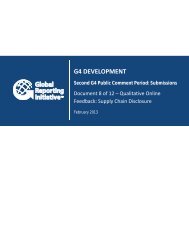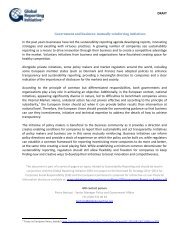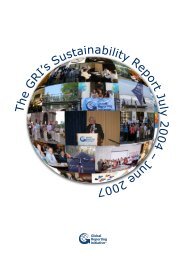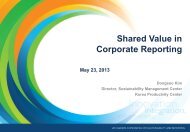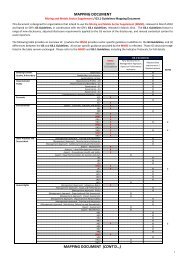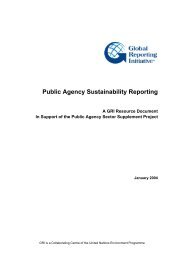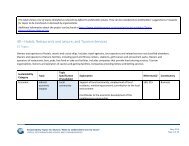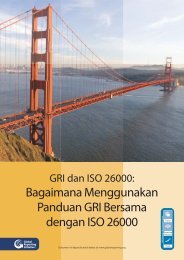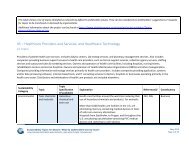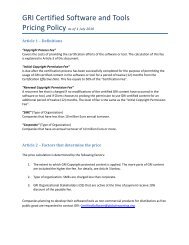CARROTS AND STICKS – PROMOTING ... - Global Reporting Initiative
CARROTS AND STICKS – PROMOTING ... - Global Reporting Initiative
CARROTS AND STICKS – PROMOTING ... - Global Reporting Initiative
Create successful ePaper yourself
Turn your PDF publications into a flip-book with our unique Google optimized e-Paper software.
76 Carrots and Sticks - Promoting Transparency and Sustainability<br />
and biodiversity relationships<br />
and their impacts on business<br />
decision-making. It is through these<br />
developments that the long-term<br />
future development of sustainability<br />
disclosure as a mainstream<br />
component of corporate reporting<br />
will be assured.<br />
Assessment<br />
Australia provides an interesting case<br />
of a non-interventionist approach to<br />
the take-up of sustainability reporting<br />
and the challenges of driving further<br />
uptake beyond “National Top 100”<br />
listed entities. In July 2009 Ernst &<br />
Young reported that, in 2008, 66%<br />
of the ASX 200 was reporting some<br />
level of sustainability information.<br />
This information was split almost<br />
evenly between content of annual<br />
reports and stand-alone sustainability<br />
reports <strong>–</strong> the latter predominantly<br />
based on the GRI reporting<br />
framework. In a comparable global<br />
context Australia lags, though not<br />
to a dramatic degree. The ICAEW<br />
in its 2009 report “Outside insights<br />
<strong>–</strong> beyond accounting” cited KPMG<br />
research (KPMG 2008) indicating<br />
in 2008, 83% of the <strong>Global</strong> Top<br />
250 were providing sustainability<br />
information in one form or another,<br />
and that on average 45% of National<br />
Top 100s were producing standalone<br />
sustainability reports. Against<br />
the background of voluntary, and<br />
thus highly selective and potentially<br />
biased, disclosure it is difficult to<br />
draw firm conclusions as to the<br />
comparative quality of Australian<br />
sustainability reporting. Nonetheless,<br />
the 2006 UNEP/Standard & Poor’s/<br />
SustainAbility survey of global<br />
reports ranked three Australian<br />
companies amongst the 50 Leaders<br />
<strong>–</strong> BHP Billiton at 12, Westpac<br />
Banking at 17 and Mecu at 30. More<br />
recently, in 2009, CSR Asia launched<br />
its Asian Sustainability Rating<br />
which provides a benchmarking of<br />
the Top 20 companies by market<br />
capitalisation in each of ten Asian<br />
markets <strong>–</strong> Australia, China, Hong<br />
Kong, India, Japan, Malaysia,<br />
Pakistan, Philippines, Singapore and<br />
Thailand. Not unsurprisingly given<br />
comparative stages in economic and<br />
market development, 12 (60%) of<br />
the Australian reviewed companies<br />
were ranked in the top 20. In each<br />
of the four categories, namely<br />
Governance Codes, CSR Strategy<br />
& Communications, Marketplace<br />
& Supply Chain and Workplace &<br />
People, the Australian companies<br />
were ranked highest in aggregate<br />
whilst Japan and India respectively<br />
ranked highest for Environment<br />
and Community & Development.<br />
Australian performance overall<br />
reflects characteristics of broader<br />
regulatory development. What<br />
needs to be acknowledged is the<br />
significant representation from the<br />
banking & finance and extractive<br />
industry sectors, each of which are<br />
characterised by the competitive and<br />
marketplace conditions which have<br />
driven uptake amongst participants<br />
and facilitated a capacity to report.<br />
Conclusion<br />
Both the fallout from the global<br />
financial crisis (GFC) and the<br />
necessary preoccupation with the<br />
compliance obligations associated<br />
with the potential introduction in<br />
Australia of an emissions trading<br />
scheme, if not dampening interest in<br />
sustainability reporting, has delayed<br />
further significant uptake. The GFC<br />
has nonetheless focused critical<br />
attention on governance and ethical<br />
practices and the embedding of risk<br />
within products, particularly those<br />
of a complex financial character.<br />
Sustainability reporting’s focus<br />
on these attributes of business<br />
behaviour along with non-financial<br />
reporting’s greater orientation to<br />
communicating views on future<br />
“Sustainability reports in Brazil are<br />
becoming an increasing reference<br />
for good business. This is not only<br />
because they are anticipating a<br />
regulatory trend, but also because<br />
the market already understands<br />
that they reduce liability risks and<br />
increase good business governance<br />
practices. It makes business sense<br />
and represents a huge step forward<br />
in social responsibility. We would<br />
never have gotten to this stage if the<br />
São Paulo Stockmarket didn’t take<br />
the initiative of creating the Business<br />
Sustainability Index. The Brazilian<br />
case shows how a collective effort<br />
involving progressive business and<br />
key civil society players can pave<br />
the way towards public/private<br />
collaboration and a supportive<br />
regulatory framework”<br />
- Ricardo Young Silva, Former Executive<br />
President of the Ethos Institute and Uniethos ,<br />
President of the Board of the Yazigi Internexus,<br />
Pre candidate for the Senate by the Green Party.<br />
performance will be significant in<br />
restoring the market, stakeholder and<br />
wider community confidence.<br />
5.2 Brazil 16<br />
Introduction<br />
It has been more than 20 years since<br />
the publication of the first social<br />
balance sheet, compiled in 1986 by<br />
Nitrofértil, a company acquired by<br />
Petrobras. Since then there has been<br />
much development in non-financial<br />
reporting in Brazil.<br />
In the ‘80s, FIDES 17 developed a<br />
voluntary model for reporting which<br />
encouraged companies to report<br />
on their community involvement,<br />
environment and workers. The<br />
initiative did not, however, gain<br />
the expected support. Apart from<br />
Nitrofértil, only two other companies<br />
published social balance sheets in<br />
the ‘80s: Telemar and Banespa.<br />
16 This section is a contribution by Ideia Sustentável, Brazil.<br />
17 Fundação Instituto de Desenvolvimento Empresarial e Social.





